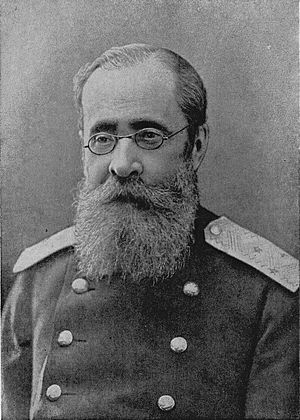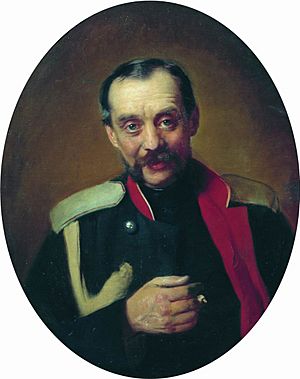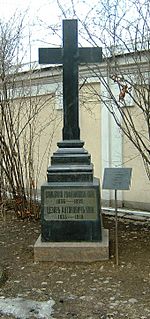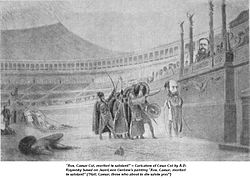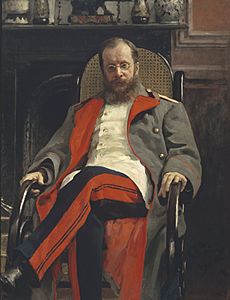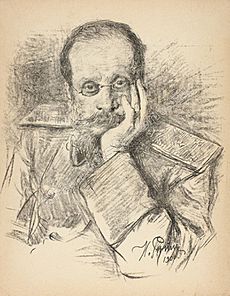César Cui facts for kids
César Antonovich Cui (born January 18, 1835 – died March 13, 1918) was a famous Russian composer and music critic. He was part of a group called The Five. This group wanted to create a unique Russian style of music.
Cui was also an officer in the Imperial Russian Army. He became a high-ranking general. He taught about fortifications (military defenses) at Russian military schools. He also wrote many books on this topic.
Contents
César Cui's Life Story
Early Life and Military Career
César Cui was born in Vilnius (then called Wilno), which is now in Lithuania. He was the youngest of five children. His family was Roman Catholic. His father was French, and his mother was Polish-Lithuanian. His father came to Russia with Napoleon's army in 1812. He settled in Vilnius after being injured in a battle.
Young César learned French, Polish, Russian, and Lithuanian. In 1850, he took music lessons from Stanisław Moniuszko. Later that year, he moved to Saint Petersburg. He prepared to join the Chief Engineering School. He entered the school at age 16.
After graduating in 1855, Cui became an instructor in fortifications in 1857. He taught at three military academies in Saint Petersburg. Even Nicholas II, who later became the Tsar, was one of his students. Cui became an expert in military defenses. He even gained experience during the Russo-Turkish War (1877–1878). In 1880, he became a professor. By 1906, he was a general. His textbooks on fortifications were used for many years.
His Musical Journey
Even though he had a busy military career, Cui was also a very active musician. When he was a boy in Vilnius, he learned to play the piano. He also started composing small pieces at age 14. His music lessons with Stanisław Moniuszko helped him a lot.
In 1856, Cui met Mily Balakirev. This meeting made him even more serious about music. He composed a lot of music and wrote many articles about music. His first public performance as a composer was in 1859. His orchestral piece, Scherzo, Op. 1, was played.
Cui's first opera was William Ratcliff, performed in 1869. Most of his operas were in Russian. One exception was Le flibustier, which premiered in Paris in 1894. However, it was not very successful.
His more popular operas during his lifetime included the funny one-act opera The Mandarin's Son (1878). Also, Prisoner of the Caucasus (1883), based on a story by Alexander Pushkin, was well-liked. Another successful one-act opera was Mademoiselle Fifi (1903).
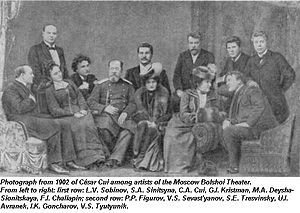
Cui was also part of the opera selection committee at the Mariinsky Theatre. He and Nikolai Rimsky-Korsakov left this committee in 1883. They protested because the committee rejected Modest Mussorgsky's opera Khovanshchina. From 1896 to 1904, Cui directed the Petersburg branch of the Russian Musical Society.
Cui knew many musicians, including Franz Liszt. Liszt greatly admired Cui's opera William Ratcliff. Cui dedicated his book La musique en Russie and his Suite pour piano, Op. 21, to Liszt.
Cui received many honors during his long musical life. He became a member of several foreign musical societies. After his opera Le flibustier was staged in Paris, he was elected to the Académie française. He also received the Légion d'honneur. In 1896, the Belgian Royal Academy of Literature and Art made him a member. In 1909 and 1910, events celebrated his 50th anniversary as a composer.
Family Life
Cui married Malvina Rafailovna Bamberg in 1858. He met her while she was taking singing lessons from Alexander Dargomyzhsky. Cui dedicated some of his music to her, including his early Scherzo, Op. 1. César and Malvina had two children, Lidiya and Aleksandr.
Later Years and Passing
In 1916, Cui became blind. However, he could still compose small pieces by dictating them. He passed away on March 13, 1918, from a brain stroke. He was first buried next to his wife Malvina (who died in 1899). In 1939, his body was moved to Tikhvin Cemetery. He now rests beside the other members of The Five.
Cui as a Music Critic
Cui wrote almost 800 articles about music between 1864 and 1918. He wrote for newspapers and other publications in Russia and Europe. He stopped writing music criticism regularly in 1900. His articles covered concerts, new music, and famous musicians. About 300 of his articles were about opera.
Some of his articles were later published as books. These books covered topics like Richard Wagner's opera Der Ring des Nibelungen and the history of Russian songs. He also wrote many books and articles about military fortifications for his main job.
Cui's main goal as a critic was to support new Russian composers. He especially promoted the music of his friends in The Five. However, he sometimes criticized even their works. For example, he wrote a very strong review of Modest Mussorgsky's opera Boris Godunov in 1874. Later in life, Cui supported Mussorgsky's music a lot. He even finished Mussorgsky's unfinished opera The Fair at Sorochyntsi.
Cui often criticized Russian composers who were not part of The Five. This was partly because he preferred composers who taught themselves music. He did not like the Western-style conservatory system. For example, he strongly criticized Pyotr Ilyich Tchaikovsky's opera The Oprichnik. He also made harsh comments about Sergei Rachmaninoff's Symphony No. 1. Luckily, both works are still enjoyed today.
Among Western composers, Cui liked Hector Berlioz and Franz Liszt. He admired Wagner's ideas for music dramas. But he did not agree with Wagner's methods, like using leitmotifs (short musical ideas for characters or themes).
Later in his life, Cui's views became less open to new ideas. He strongly disliked younger "modern" composers like Richard Strauss. His last articles, written in 1917, were funny but harsh parodies. They included a song called "Hymn to Futurism" and "How to Become a Modern Composer of Genius without Being a Musician."
Cui as a Composer
Cui wrote music in almost all styles of his time. He did not write symphonies, symphonic poems, or concertos for solo instruments. But he wrote many art songs, including songs for children and vocal duets. Some of his songs can also be played with an Orchestra. Some of his most famous songs are "The Statue at Tsarskoye Selo" and "The Burnt Letter." Both are based on poems by Alexander Pushkin, Cui's favorite poet.
Cui also wrote many pieces for piano and for chamber groups. These include three string quartets. He wrote many choruses and several orchestral works. But his most important works are his fifteen operas.
Besides children's music, three other types of his compositions stand out:
- Pieces inspired by and dedicated to the Comtesse de Mercy-Argenteau.
- Works connected to the Circle of Russian Music Lovers.
- Pieces inspired by the Russo-Japanese War and World War I.
In recent years, Puss in Boots, one of his four children's operas, has become popular in Germany. Even though more of Cui's music is available now, it is not often performed today. His most famous pieces are some of his piano and chamber music, like the violin and piano piece Orientale. Many people believe his best talent was capturing a mood quickly in his songs and short instrumental pieces.
Cui's music is not as strongly "Russian" as the music of the other members of The Five. His operas, except for those based on Pushkin, do not often use Russian stories. However, most of his songs use Russian words. Some of his music, like parts of his opera The Captain's Daughter, does use Russian folk music styles. But his overall style is often compared to Robert Schumann and French composers like Charles Gounod.
Literary works
A list of Cui's writings on music and military architecture can be found at List of literary works by César Cui.
Images for kids
See also
 In Spanish: César Cui para niños
In Spanish: César Cui para niños
 | DeHart Hubbard |
 | Wilma Rudolph |
 | Jesse Owens |
 | Jackie Joyner-Kersee |
 | Major Taylor |


